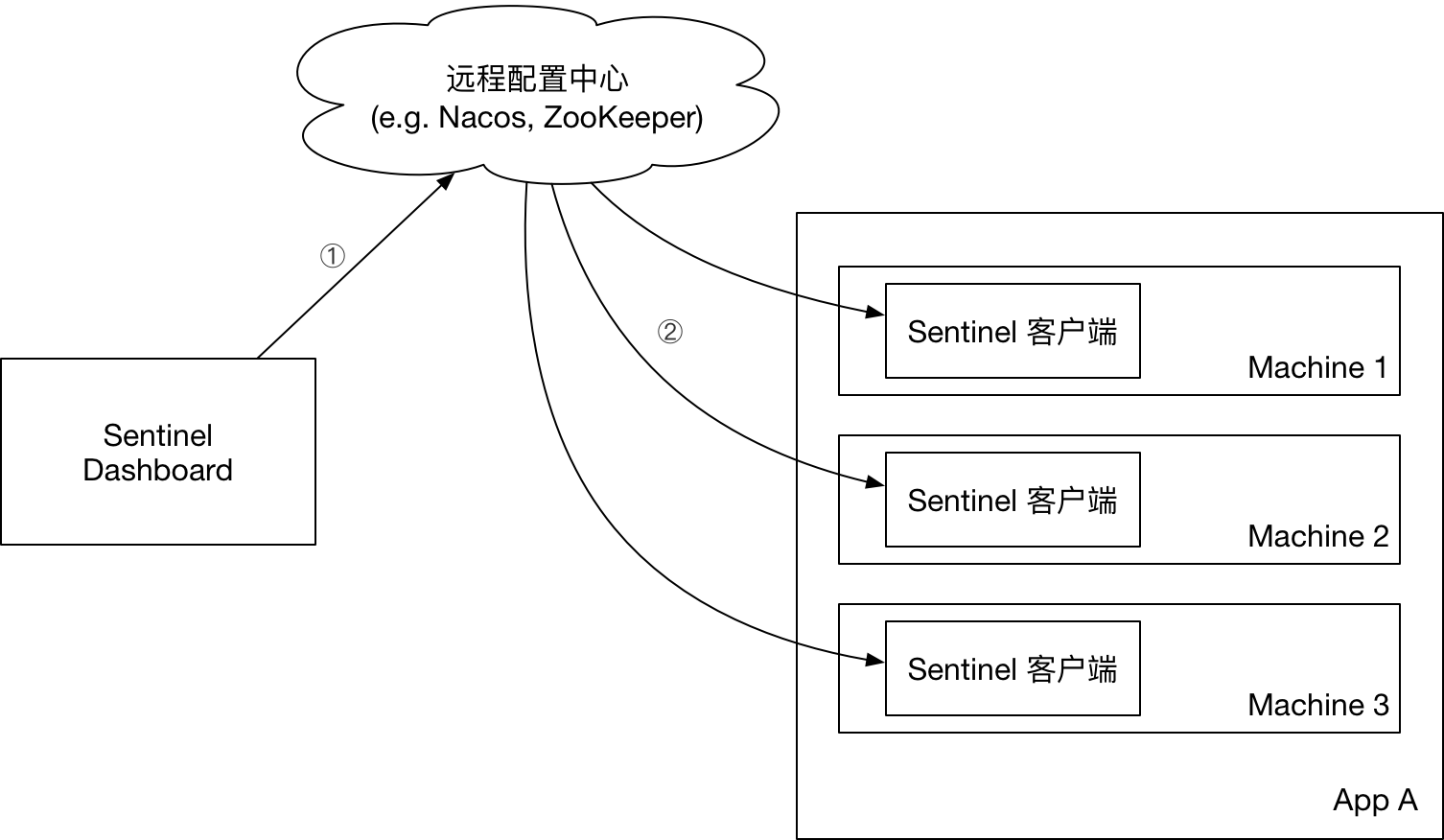SpringBoot 2.0 + Nacos + Sentinel 流控規則集中儲存

前言
Sentinel 原生版本的規則管理通過API 將規則推送至客戶端並直接更新到記憶體中,並不能直接用於生產環境。不過官方也提供了一種 Push模式,擴充套件讀資料來源ReadableDataSource,規則中心統一推送,客戶端通過註冊監聽器的方式時刻監聽變化,比如使用 Nacos、Zookeeper 等配置中心。這種方式有更好的實時性和一致性保證。這裡我們通過配置 Nacos 來實現流控規則的統一儲存配置。
架構

控制檯推送規則至配置中心,客戶端通過監聽事件從配置中心獲取流控規則。
客戶端配置
pom.xml 引入:
<dependency> <groupId>com.alibaba.csp</groupId> <artifactId>sentinel-datasource-nacos</artifactId> <version>1.6.3</version> </dependency>
配置檔案:
# nacos的訪問地址,配置參考 https://blog.52itstyle.vip/archives/4174/ spring.cloud.sentinel.datasource.ds.nacos.server-addr=47.104.187.19:8848 #nacos中儲存規則的dataId,對於dataId使用了${spring.application.name}變數,這樣可以根據應用名來區分不同的規則配置 spring.cloud.sentinel.datasource.ds.nacos.dataId=${spring.application.name}-flow-rules #nacos中儲存規則的groupId spring.cloud.sentinel.datasource.ds.nacos.groupId=SENTINEL_GROUP #定義儲存的規則型別 spring.cloud.sentinel.datasource.ds.nacos.rule-type=flow
控制檯配置
修改 pom.xml,原來的<scope>test</scope>去掉:
<dependency>
<groupId>com.alibaba.csp</groupId>
<artifactId>sentinel-datasource-nacos</artifactId>
</dependency>把 src/test 下面的包 com.alibaba.csp.sentinel.dashboard.rule.nacos 拷貝到src/main/java 下面。
修改 NacosConfig:
/**
* @author Eric Zhao
* @since 1.4.0
*/
@Configuration
public class NacosConfig {
@Value("${nacos.address}")
private String address;
@Bean
public Converter<List<FlowRuleEntity>, String> flowRuleEntityEncoder() {
return JSON::toJSONString;
}
@Bean
public Converter<String, List<FlowRuleEntity>> flowRuleEntityDecoder() {
return s -> JSON.parseArray(s, FlowRuleEntity.class);
}
@Bean
public ConfigService nacosConfigService() throws Exception {
Properties properties = new Properties();
properties.put("serverAddr",address);
return ConfigFactory.createConfigService(properties);
}
}application.properties 配置引入 Nacos:
# nacos的訪問地址,配置參考 https://blog.52itstyle.vip/archives/4174/
nacos.address=47.104.197.19:8848FlowControllerV2 指定對應的 Bean 開啟 Nacos 適配。
@Autowired
@Qualifier("flowRuleNacosProvider")
private DynamicRuleProvider<List<FlowRuleEntity>> ruleProvider;
@Autowired
@Qualifier("flowRuleNacosPublisher")
private DynamicRulePublisher<List<FlowRuleEntity>> rulePublisher;修改sidebar.html頁面, 流控規則路由從 dashboard.flowV1 改成 dashboard.flow
<-- nacos 動態規則配置-->
<li ui-sref-active="active" ng-if="!entry.isGateway">
<a ui-sref="dashboard.flow({app: entry.app})">
<i class="glyphicon glyphicon-filter"></i> 流控規則</a>
</li>如圖所示,介面會多了一個回到單機頁面的按鈕,這裡我們新增一個流控規則。

登入 Nacos 後臺,配置管理->配置列表:

點選進入配置詳情,配置內容如下:
[{
"app": "blog",
"clusterConfig": {
"fallbackToLocalWhenFail": true,
"sampleCount": 10,
"strategy": 0,
"thresholdType": 0,
"windowIntervalMs": 1000
},
"clusterMode": false,
"controlBehavior": 0,
"count": 2.0,
"gmtCreate": 1568617671812,
"gmtModified": 1568622253889,
"grade": 1,
"id": 6,
"ip": "10.136.168.88",
"limitApp": "default",
"port": 8720,
"resource": "blogView",
"strategy": 0
}]小結
生產環境下,推送規則正確做法應該是 配置中心控制檯/Sentinel 控制檯 → 配置中心 → Sentinel 資料來源 → Sentinel。
案例
https://gitee.com/52itstyle/spring-boot-blog
參考
https://github.com/alibaba/Sentinel
https://github.com/alibaba/Sentinel/tree/master/sentinel-dashbo
